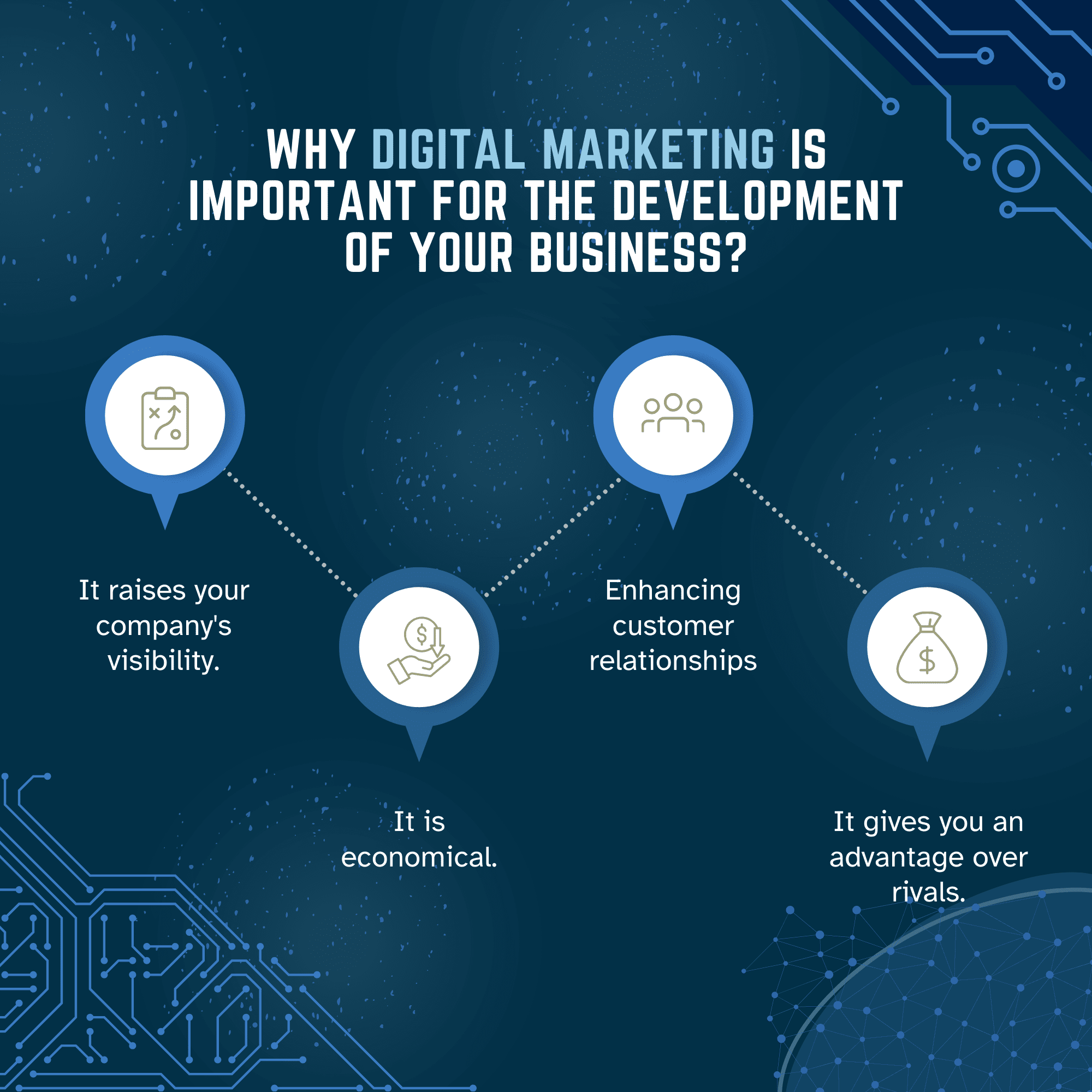Digital Marketing: The Ultimate Guide to Growing Your Business Online

What is Digital Marketing?
Digital marketing refers to the use of online channels, strategies, and tools to promote products and services. It leverages digital platforms such as search engines, social media, email, and websites to connect with potential customers, increase brand awareness, and drive sales.
Importance of Digital Marketing
1. Cost-Effective
Compared to traditional marketing methods like TV ads, billboards, and print media, digital marketing offers a much more affordable option. Small businesses can run targeted campaigns on a low budget, using strategies like social media marketing, email marketing, and SEO to generate high returns on investment (ROI).
2. Global Reach
With digital marketing, businesses can expand beyond geographical boundaries. A well-optimized website and social media presence allow brands to reach potential customers across different regions and time zones, making it easier to scale operations internationally.
3. Measurable Results
One of the biggest advantages of digital marketing is the ability to track and analyze campaign performance in real time. Tools like Google Analytics, Facebook Insights, and email marketing software provide valuable insights into user behavior, engagement rates, and conversion metrics.
4. Better Targeting
Digital marketing enables businesses to target their ideal customers based on demographics, interests, online behavior, and purchasing patterns. This ensures that marketing efforts reach the right audience, leading to higher engagement and conversion rates.
5. Higher Engagement
Unlike traditional marketing, which is a one-way communication channel, digital marketing encourages two-way interactions. Customers can engage with brands through social media, email responses, blog comments, and live chat, building strong relationships and brand loyalty.
Key Components of Digital Marketing
1. Search Engine Optimization (SEO)
SEO involves optimizing a website’s content, structure, and backlinks to rank higher in search engine results. A well-executed SEO strategy improves organic traffic and credibility. Key SEO techniques include:
- On-Page SEO: Optimizing title tags, meta descriptions, and content structure.
- Off-Page SEO: Building high-quality backlinks and improving domain authority.
- Technical SEO: Enhancing site speed, mobile-friendliness, and structured data.
2. Content Marketing
Content marketing revolves around creating valuable and relevant content to attract and retain customers. This includes:
- Blog posts: Informative and SEO-optimized articles to educate and engage users.
- Videos: Visual storytelling to explain products, services, and brand messages.
- Infographics: Data-driven graphics to simplify complex topics.
- Case studies: Success stories to build trust and credibility.
3. Social Media Marketing
Social Media Marketing strategy uses platforms like Facebook, Instagram, Twitter, and LinkedIn to:
- Engage with followers through posts, comments, and direct messaging.
- Run paid advertisements targeting specific demographics.
- Increase brand awareness through influencer collaborations and viral campaigns.
4. Pay-Per-Click Advertising (PPC)
PPC allows businesses to pay for top positions on search engines and social media platforms. Google Ads and Facebook Ads are popular PPC platforms. This strategy provides instant visibility and works well when combined with SEO efforts.
5. Email Marketing
Email marketing involves sending targeted messages to potential and existing customers. A well-crafted email campaign includes:
- Newsletters: Regular updates about products, promotions, and industry trends.
- Automated Drip Campaigns: Pre-scheduled emails triggered by user actions.
- Personalized Offers: Tailored recommendations based on customer preferences.
6. Affiliate Marketing
Affiliate marketing is a performance-based strategy where businesses partner with affiliates who promote their products in exchange for commissions. This is widely used in e-commerce and software industries.
7. Influencer Marketing
Collaborating with influencers helps brands gain credibility and reach a wider audience. Influencers create authentic content that resonates with their followers, increasing brand awareness and trust.

How to Create a Successful Digital Marketing Strategy
1. Define Your Goals
The first step in building a digital marketing strategy is setting clear, measurable objectives. Common goals include increasing website traffic, generating leads, boosting sales, or enhancing brand awareness. A well-defined goal helps in selecting the right marketing techniques and measuring success.
2. Identify Your Target Audience
Understanding your audience is crucial for an effective marketing campaign. Research your ideal customers’ demographics, interests, online behavior, and purchasing habits. Use tools like Google Analytics, Facebook Audience Insights, and customer surveys to gather valuable insights.
3. Choose the Right Digital Channels
Not all marketing channels will be effective for your business. Depending on your target audience, select platforms that align with your business objectives. For instance:
- B2B businesses benefit from LinkedIn and email marketing.
- B2C brands see higher engagement on Instagram, Facebook, and YouTube.
- SEO and content marketing work well for long-term brand growth.
4. Create High-Quality and Engaging Content
Content is the backbone of digital marketing. Develop a content strategy that includes:
- Blogging: SEO-friendly and informative articles that address customer pain points.
- Videos: Engaging video content, tutorials, and testimonials to boost brand engagement.
- Social Media Posts: Interactive and shareable content that increases visibility.
- Email Newsletters: Personalized messages to nurture customer relationships.
5. Optimize for SEO
SEO ensures your digital content ranks well on search engines and reaches the right audience. Implement keyword research, optimize on-page elements, and build high-quality backlinks to improve your website’s visibility.
6. Utilize Paid Advertising
For instant traffic and targeted reach, paid advertising is an effective strategy. Google Ads, Facebook Ads, and Instagram Ads allow businesses to create highly specific campaigns tailored to their ideal customers.
7. Analyze and Improve Your Strategy
Continuous monitoring and optimization are key to a successful digital marketing strategy. Track key performance indicators (KPIs) such as website traffic, conversion rates, and customer engagement. Use analytics tools to assess performance and refine your strategies for better results.
Future Trends in Digital Marketing
- AI and Automation: AI-driven tools enhance customer engagement and streamline marketing efforts.
- Voice Search Optimization: Optimizing content for voice search queries will become increasingly important.
- Video Marketing Growth: Short-form video content will continue dominating digital marketing.
- Personalization: Data-driven marketing will enable more personalized customer experiences.
- Interactive Content: Quizzes, polls, and interactive posts will boost engagement rates.
FAQs
Conclusion
Digital marketing is a powerful tool that helps businesses grow, connect with their audience, and boost sales. By leveraging various digital marketing techniques, companies can establish a strong online presence and stay ahead in today’s competitive market. Start implementing these strategies today to achieve your business goals!
